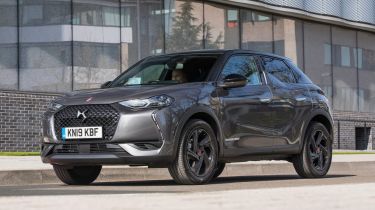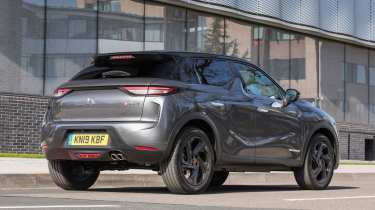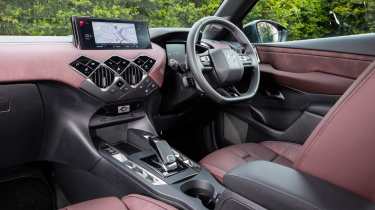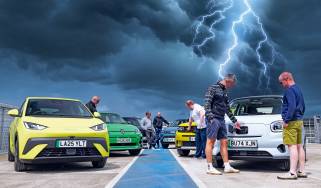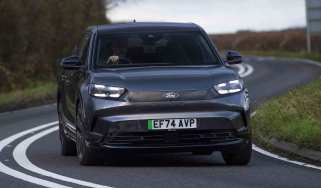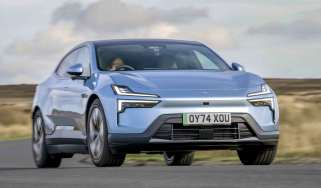Used DS 3 (Mk1, 2019-date) buyer’s guide: smart, stylish, but far from perfect
A full used buyer’s guide on the DS 3 covering the Mk1 that’s been on sale since 2019
Verdict
It’s hard to recommend the DS 3 as a new buy because of high prices; DS sees itself as a premium brand, but buyers don’t. Hefty depreciation means these stylish small SUVs are a better bet as a used buy, because they’re great value compared with rivals. The DS 3 is available with petrol, diesel, electric and hybrid powertrains, so in theory there’s one for everyone, though the interior design is divisive, reliability is patchy, the cabin is cramped and the ride quality is disappointing. But the DS 3 is easy to drive, it looks smart, plus it’s well equipped, especially if you buy further up the range.
Next year will mark a decade since the DS brand was spun off from Citroen by then-owner PSA. Since then, PSA has become Stellantis, and while the cars from all brands within the group have come on in leaps and bounds over the past few years, DS has struggled to gain traction in the UK.
The French marque accounts for just 0.06 per cent of the market, with sales of 1,152 in 2024– that’s less than half of what DS achieved in the previous year. Yet, despite low sales, models such as the DS 3 Crossback can be tempting as a used buy – even if it’s no class leader in any respect, it’s an interesting and distinctive choice.
History
The DS 3 Crossback hit UK roads in May 2019. There was a 1.2-litre three-cylinder PureTech turbocharged petrol engine with 100, 130 or 155bhp, or a 101bhp 1.5 BlueHDi diesel. While the PureTech 130 and 155 came only in eight-speed auto form, the PureTech 100 and BlueHDi 100 were available solely with a six-speed manual gearbox. In January 2020 the electric DS 3 Crossback E-Tense joined the range, with a 134bhp electric motor and a 50kWh battery.
Used - available now
A facelift in spring 2023 brought a change of name (now just DS 3), a 153bhp motor and 54kWh battery for the E-Tense, refreshed exterior styling, new trim levels and extra standard equipment; the diesel option was also dropped. A self-charging hybrid was introduced in May 2024; it was based on the PureTech 130, adding a 27bhp motor powered by a 0.9kWh battery.
On the road
The DS 3 is easy to drive, but it isn’t at all rewarding, because the steering feels too remote. Refinement is good and so is ride comfort, but the latter comes at the expense of handling. Its performance is good though – the E-Tense doesn’t accelerate as rapidly as some rivals but it’s quick enough, while the petrol and diesel engines give a good turn of speed. In short, the Crossback is capable, but it doesn’t stand out in any way.
Which one should I buy?
In some ways, the E-Tense is the pick of the bunch, and you’ll pay less for one of these than for an equivalent petrol or diesel model. But if you prefer an engine, we wouldn’t dissuade you; the PureTech and BlueHDi units are pleasant enough to drive.
All DS 3s are well equipped, but deciphering the model range isn’t easy to understand. It started out as Elegance, Performance Line, Prestige and Ultra Prestige before morphing into Montmartre, Bastille, Rivoli, Performance Line and Performance Line+. From the 2023 facelift, the last two went from topping the range to being entry-level models, with Rivoli and Opera above them.
Alternatives to the DS 3
There are many rivals, not least because the Peugeot 2008/E-2008 and Vauxhall Mokka are have the same underpinnings as the DS. They’re more widely available, have more cabin space and are better value.
As a new car, the DS also competes with models such as the Audi Q2, Volvo XC40, Volkswagen T-Roc and BMW X1, along with the Lexus LBX. However, these all cost considerably more as used buys, because they depreciate far more slowly.
That also goes for the MINI Countryman, or if you’re after an EV, the Hyundai Kona Electric and the Kia E-Niro. Other contenders include the MG ZS, Citroen’s C4 and e-C4 along with the Volkswagen ID.3, while the Ford Puma is a superb alternative.
Use our valuation tool to check the price of a DS 3.
What to look for
On the pull
When it comes to towing, all petrol and diesel DS 3s are rated at a maximum of 1,200kg, but the electric E-Tense isn’t able to tow.
Charging ahead
The E-Tense can charge at up to 100kW, but sometimes the dash tells porkies about how much juice is in the batteries. Owners aren’t impressed by the app, either.
Electronic glitches
The infotainment screen has been known to go blank for no reason, then just spring back to life. The screen isn’t all that responsive and the same is true of some of the touch-sensitive switches.
Wet belt woes
Petrol models have a ‘wet belt’ engine, meaning cambelt intervals must be obeyed. There are reports of shredded belts causing oil delivery problems, leading to complete engine failure.
Interior
DS hasn’t produced just another generic cabin design, and for that it should be applauded. The choice of materials is good, with a high standard of fit and finish, but things fall down ergonomically because the switchgear isn’t laid out intuitively and can be fiddly to use on the move, with some buttons tucked away. The touch-sensitive controls provide no feedback, while too many of the functions are operated via the infotainment, including the climate control.
The DS 3 is a small SUV with a shortage of cabin space; things are pretty tight in terms of legroom, while head room isn’t generous, and nor is boot space at 350 litres, extending to 1,050 litres with the rear seats folded down.
Running costs
Running costs should be sensible, but if you buy badly, you’ll lose a packet in depreciation. All DS 3s need to be serviced every 12 months or 12,500 miles, alternating between Minor and Major at £254 and £410.
Whereas the diesel engine is chain-driven, the petrol engines have a cambelt that needs to be replaced every six years or 62,500 miles; you’ll pay around £750 for this and, as you’ll see from our checklist (right), doing so is hugely important.
Insurance groups range from 14 to 25 for ICE models whereas E-Tense editions are in groups 28-31. Official fuel consumption figures are typically 45mpg for the petrol models, with the diesel rated at 10mpg or so more.
Recalls
A particular disappointment is that the DS 3 has been recalled on nine occasions so far, the first time as early as February 2020 because some cars could suffer from brake pipe failure. AdBlue problems on diesel models led to a recall in December 2020, while wiring loom glitches on E-Tense editions were behind a campaign in July 2022.
There were three recalls in 2023. The first two were because of faulty software that could lead to a loss of drive (the traction battery control unit was the problem with the first recall, while the air-conditioning compressor was behind the problems the second time round). The final one of the trio of recalls in 2023 was down to fuel leaks from the engine bay.
There were three more recalls in 2024, because of emissions problems through faulty software, sub-standard steering racks, and the failure of various driver-assistance systems, once again because of software glitches.
Driver Power owner satisfaction
While the original DS 3 appeared in our Driver Power New Car surveys as a standalone brand, DS has never made an appearance, largely because its cars sell in small quantities.
However, other Stellantis brands have featured in our polls; while Vauxhall doesn’t normally do that well, Peugeot and Citroen have been on a roll lately, with the Citroen C4 Mk3 coming an impressive first place in 2023.
SEE OUR LATEST USED DS 3 DEALS HERE
Did you know you can sell your car with Auto Express? Get the highest bid from our network of over 5,500 dealers and we'll do the rest. Click here to try Auto Express Sell My Car now...

